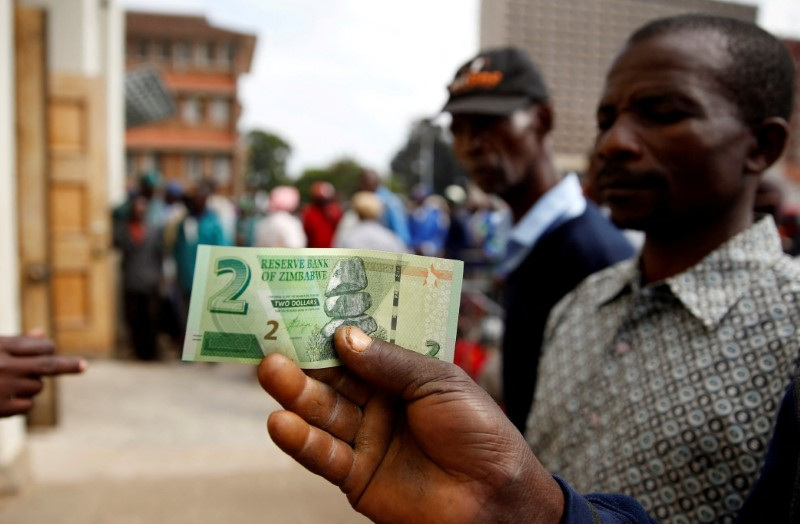World Bank: Zimbabwe economy is ‘at a crossroads’. Five key recommendations from new report

Zimbabwe is at “a crossroads”, and the decisions the country takes now will decide whether the economy recovers, or faces more years of decline, the World Bank says in a new report.
The report recommends currency reforms and changes to laws governing mining and agriculture, two of the sectors that the World Bank says have the potential to lift Zimbabweans from worsening poverty.
“Zimbabwe is at a crossroads and the path that it takes will have consequences for both its development and climate action. Key sovereign decisions on macroeconomic policy, debt, mining sector governance, agricultural policy, and social protection will either keep the country on an LMIC (lower middle-income country) path or open the door to an Upper Middle-Income Country (UMIC) path,” the World Bank says.
In its report, the World Bank maps two possibilities for Zimbabwe. In the first, Zimbabwe sticks to “business-as-usual” and stays on its current path. Zimbabwe would see stunted growth of around 3% a year, the government would get less revenue from an informalised economy, and the country would be even more vulnerable to climate change shocks, mostly drought.
But by changing course, Zimbabwe can grow rapidly at 10% per year over the next decade. Mining can double by 2050, and industry and services can grow tenfold. The World Bank says Zimbabwe has strong competitive advantage in key areas, among them agriculture, mining and tourism.
Says the World Bank: “Notably, the report finds Zimbabwe to be highly competitive in several value chains in agriculture and agribusiness industries, including sugar, cotton, horticulture, as well as meat and dairy. Furthermore, tourism and mining of energy transition minerals – including ample reserves of lithium — hold significant potential in the short term.”
But there are key issues holding back the economy; macroeconomic instability, low access to finance, energy and transport, and digital. The World Bank makes recommendations on reforms to take advantage of this potential. Below, we summarise some of them.
Fix the currency
Says the World Bank: “Liberalisation of the foreign exchange market, abolition of foreign exchange surrender requirements, and reform of the Reserve Bank of Zimbabwe’s (RBZ’s) quasi-fiscal operations are the most urgent measures to reestablish macroeconomic equilibrium. Without such measures, efforts to tighten monetary and fiscal policy will not be effective.”
World Bank recommends that Zimbabwe ends currency controls and removes the retention scheme, under which exporters are compelled to sell 25% of their earnings to RBZ in Zimdollars. World Bank says this is “a significant tax” on exporters.
On mining: Reform laws, end state interference, go green
World Bank says Zimbabwe needs a “robust governance framework for mining” to “attract high-quality investors to its mining sector and downstream value-addition opportunities.”
Zimbabwe has resources of platinum and lithium, both critical in energy transition. Zimbabwe needs to modernise its laws and end uncertainty, the World Bank recommends, citing regular shifts on royalties.
The World Bank also cautions against state ownership of mines: “There needs to be a shift away from state ownership of mining interests toward a transparent and competitive allocation of mining concessions with green mining standards.”
On lithium, the World Bank says: “Develop a national battery minerals strategy and action plan, including a forward-looking fiscal framework incentivising production and value addition for battery minerals, geoscientific mapping to increase exploration activity and resource discovery, and required infrastructure development.”
On Agric: Climate response
The World Bank says the frequency of droughts rose from one in ten growing seasons in 1902–1979, to one in every four seasons in the period 1980–2011. This means Zimbabwe needs to invest more in climate resilience. Recommendations increase more investment in smallholder irrigation, climate-smart agriculture, and modernising marketing systems.
Zimbabwe also needs to end tenure uncertainty. Says the World Bank: “Improve tenure arrangements for commercial agricultural land, review and streamline the procedure for the issuance of 99-year leases, to improve land transferability and bankability features.”
On Tourism: fix infrastructure, diversify
Among its recommendations on tourism, the World Bank says licensing must be streamlined to a single automated application portal.
The country also needs to fix roads leading to tourist sites. “Develop a comprehensive programme to repair and resurface key tourism access highway corridors and improve public utility services along these corridors.”
Government should offer airlines incentives to improve local connectivity, strengthen the Zimbabwe Tourism Authority’s marketing, diversify Zimbabwe’s tourism offerings and develop skills in the sector.
On digital: Allow operators to thrive
The World Bank says government should allow telecoms operators to charge cost-effective tariffs to support growth and investment.
“The inability of telecom operators to peg their price on a stable currency or pass on hyperinflation limits their incentives to invest. Introduce a flexible approach to price regulation by allowing telecom operators to pass on inflation within a predefined range,” the World Bank recommends.

